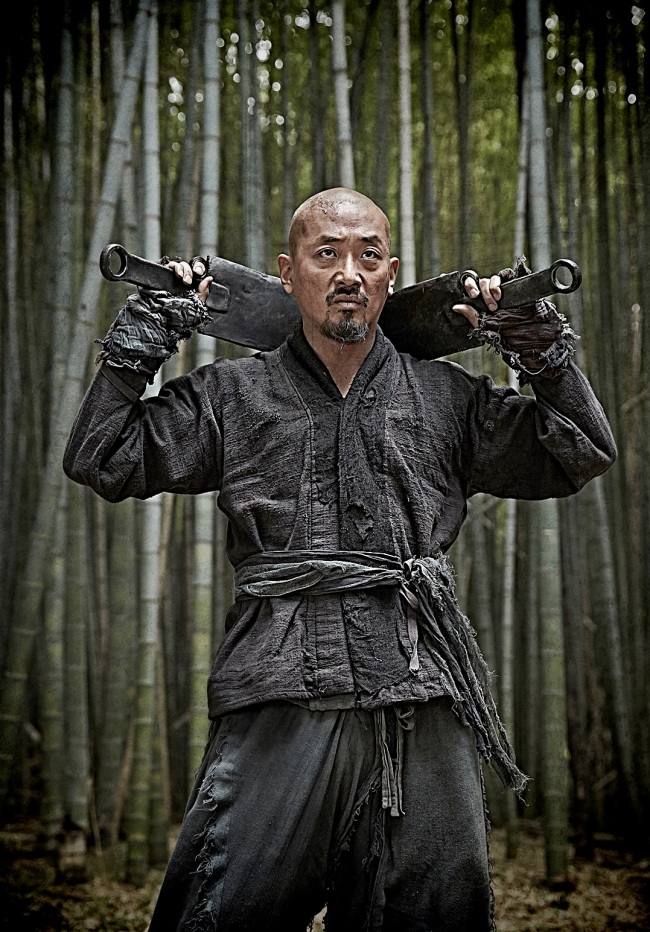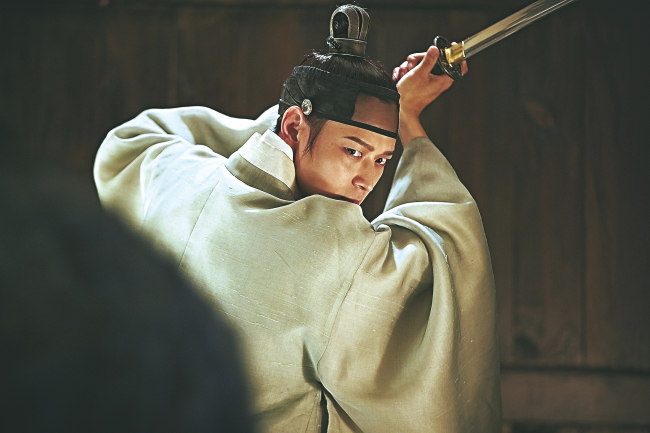[Herald Review] No heroes in hero flick ‘Kundo’
‘Kundo: Age of the Rampant’ takes audiences to Joseon era on ride of humor, action and lessons
By Korea HeraldPublished : July 20, 2014 - 21:05
Dolmuchi, the protagonist of the film “Kundo: Age of the Rampant,” is not the typical kind of hero that people see in movies.
Played by Ha Jung-woo (“Love Fiction,” “The Chaser”), he is a butcher, an undesirable occupation that automatically placed a person at the lowest strata of commoners in the mid-19th century Joseon era (1392-1910). He slaughters animals, cuts the meat with his iron axe and sells it to noble families for less than a penny. He is an 18-year-old with patchy and thick long hair. He is not so intelligent but is kindhearted and satisfied with life as long as he has food for the day.

Played by Ha Jung-woo (“Love Fiction,” “The Chaser”), he is a butcher, an undesirable occupation that automatically placed a person at the lowest strata of commoners in the mid-19th century Joseon era (1392-1910). He slaughters animals, cuts the meat with his iron axe and sells it to noble families for less than a penny. He is an 18-year-old with patchy and thick long hair. He is not so intelligent but is kindhearted and satisfied with life as long as he has food for the day.


“I didn’t give Dolmuchi hero-type characteristics because that is not what I wanted to say through the film,” said director Yoon Jong-bin at the film’s press premiere last week. “It is not the special or talented people, but very ordinary people who can change the world, especially when gathered en masse.”
In this Robin Hood-type story, a group of bandits known as Kundo represents the common and good people who fight against the villainous privileged class, represented by Jo Yoon, a nobleman’s son played by Gang Dong-won.
Dolmuchi joins the group of bandits after his mother and sister are killed in an accident resulting from a naive deal he made with Jo. Deep grief and anger lead Dolmuchi to join the crew and change his name to Dochi, a pivotal moment represented by his new hairdo ― shaving his head. With the help of Kundo, he swears to take revenge on Jo.
Under the rallying cry “We are people when we stand together, but when we disperse, we are bandits,” the members of Kundo use swords and bows to defend the weak and poor against the Jo clan of the upper class.
The chronic hunger and pain of the common people of the time are illustrated throughout the film, prompting viewers to frown yet sympathize with the realities of the Joseon era. It takes place during the 13th year of King Cheoljong’s reign, when the corruption in the ruling class and its exploitation of the populace pushed the common people over the edge.
The setting is weighty, yet the director adds stirring action and a proper dose of humor to allow audiences to laugh at potentially serious situations and at the limitations Dochi faces as a down-to-earth hero. Country and Western music plays during the intense melee scenes, which creates a sense of elation.
While Dochi represents a friendly and warm hero, his nemesis Jo is a cold-hearted villain who kills people without regret or sorrow, like fire versus water.
Yet, Jo is unlike a typical villain. He is able to earn the audience’s sympathy. As a sad child born out of wedlock, his tragic past gives him the right to act a certain way. So when Jo cries out: “Only those who have bet their life to change their given fate can fight against me,” viewers might not agree but understand.
Moreover, the heartthrob Gang is one of a kind, able to make a series of cruel decisions yet still earn the audience’s pity, thanks to his charms.
If viewers are expecting poetic justice, where virtue is ultimately rewarded and vice punished, they are not going to see much of that in the film. But there is a lot to enjoy, including the casting of diverse characters, which adds to the director’s intended theme of group-heroes.
“Kundo: Age of the Rampant” opens in theaters Wednesday.
By Ahn Sung-mi (sahn@heraldcorp.com)
-
Articles by Korea Herald



![[Herald Interview] 'Amid aging population, Korea to invite more young professionals from overseas'](http://res.heraldm.com/phpwas/restmb_idxmake.php?idx=644&simg=/content/image/2024/04/24/20240424050844_0.jpg&u=20240424200058)













![[KH Explains] Korean shipbuilding stocks rally: Real growth or bubble?](http://res.heraldm.com/phpwas/restmb_idxmake.php?idx=652&simg=/content/image/2024/04/25/20240425050656_0.jpg&u=)

